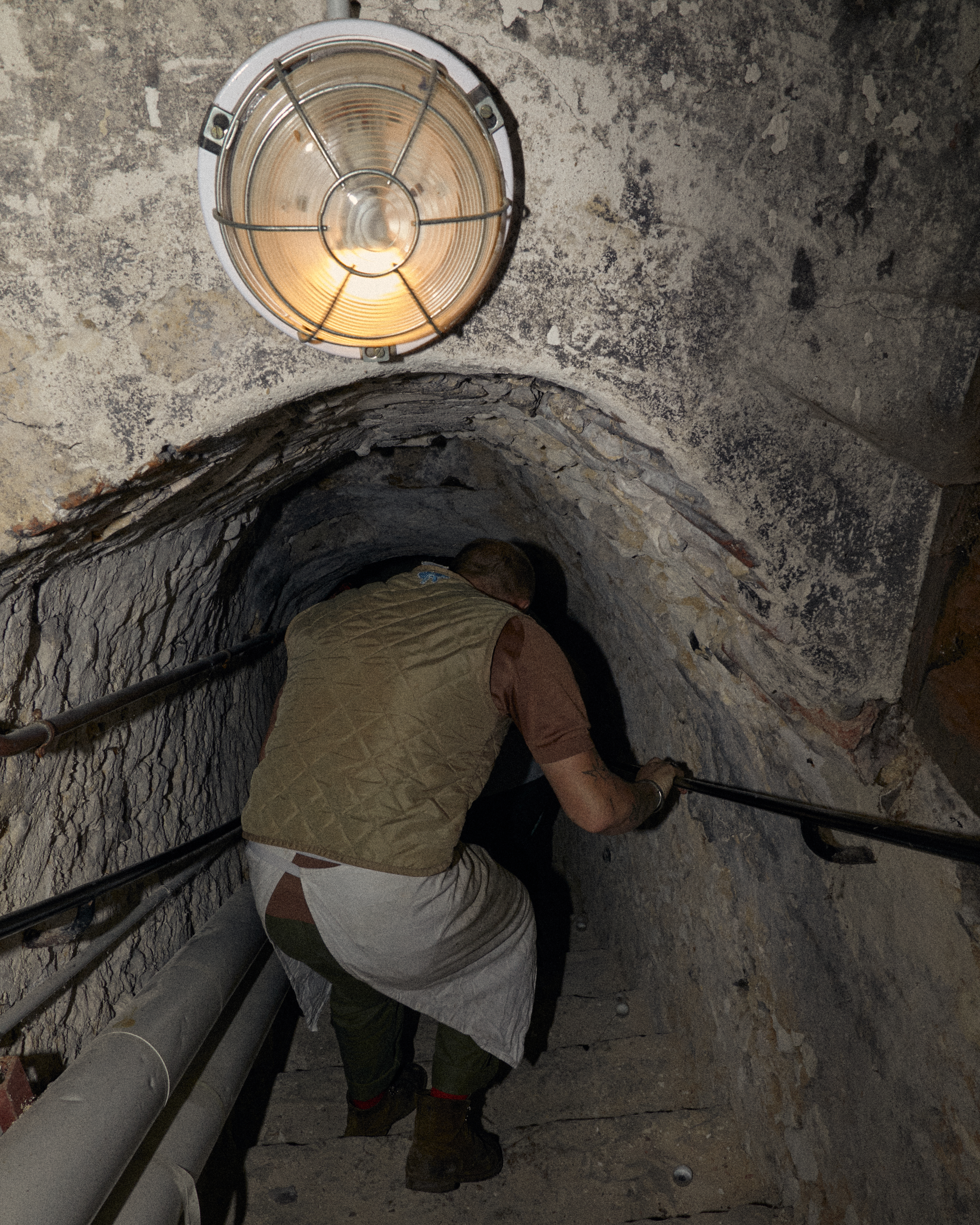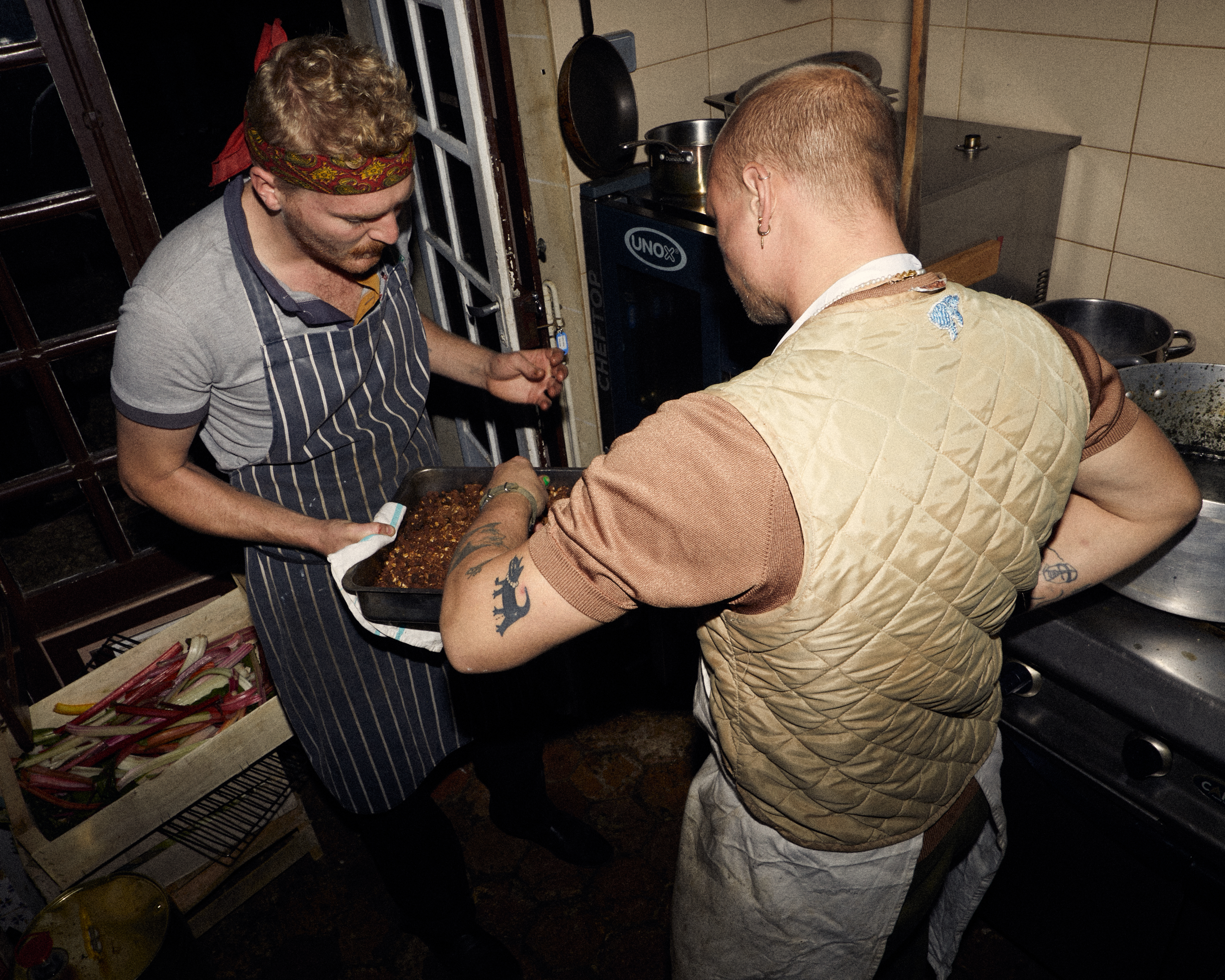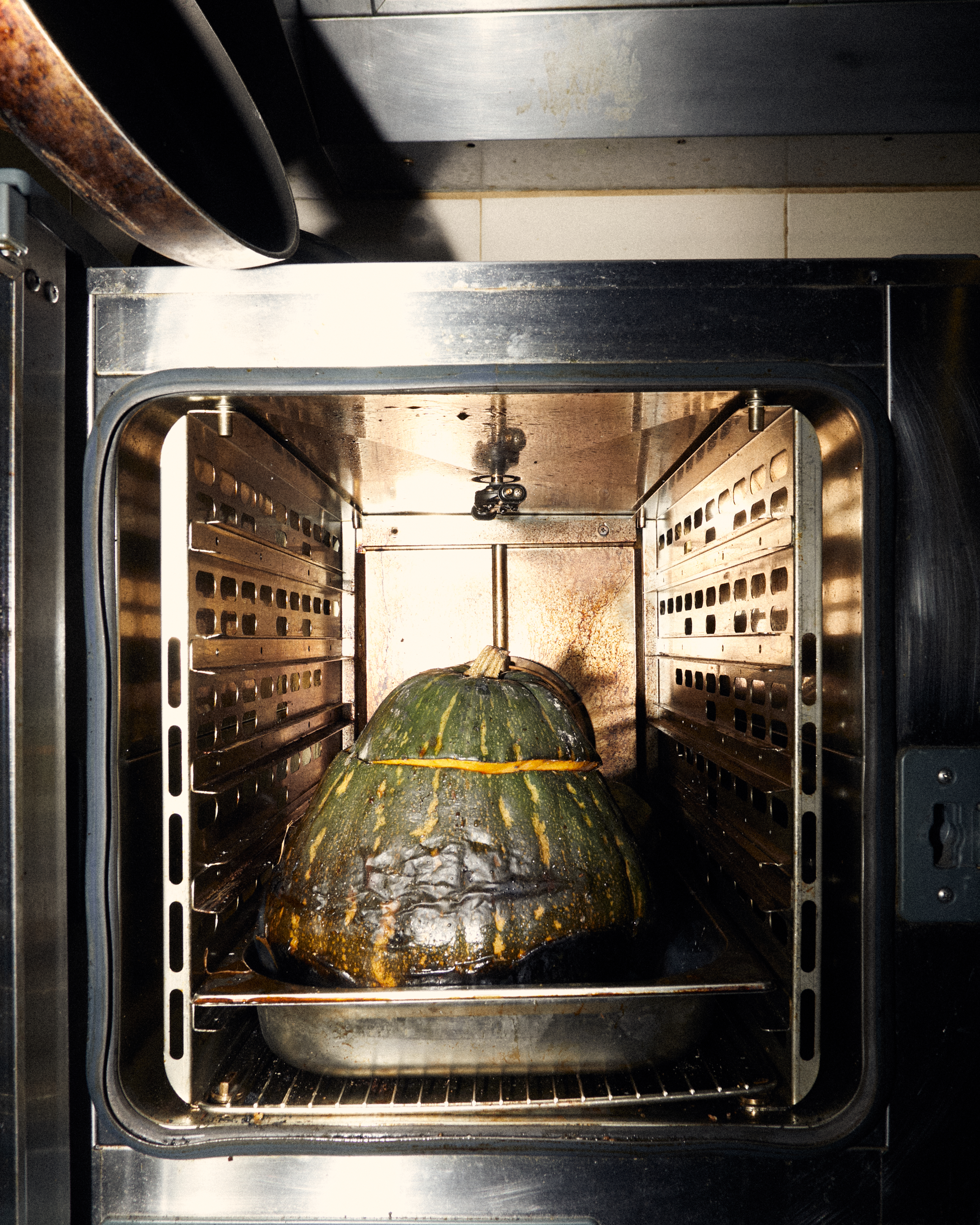

Mathias Ovesen & Harry Wilson
by Joshua OlleyI first met Matt and Harry when I moved to Paris in 2022. Matt, his wife and their two dogs were my first roommates when I moved to the city. Matt quickly introduced me to his world of culinary experts and restauraters. During this time Matt and Harry both worked at Au Passage and I began spending a lot of time there. Immediately I was drawn to not only the way they cooked, but also their personalities and their ethos around cooking. Harry seemed to wear a Hawaiian shirt and flip flops almost every time I saw him in the kitchen. Matt wore his larger than life personality and unique style. They seemed to be pirate chefs working in one of Paris’ more popular restaurants.
Can you tell me a little bit about how you found yourself in the culinary world and where you grew up?
Mathias Ovesen
I grew up in this little countryside town in Denmark. I started working at the chateau, a castle, in the woods, close to where I was living. I started as a dishwasher, peeling potatoes, bussing tables - all that classic shit. Then slowly I was going up the ranks as prep cook, helping servers, and general things through the restaurant. I fell in love with it there. I was fourteen at that time, and I’ve just kept going ever since.
Harry Wilson
A little bit similar, a little bit different at the same time. I grew up in London. When I was a teenager I had a weekend job, washing dishes. I went to university, I was a musician and studied music. Around the age of 19 or 20, I started losing interest in that whole scene, kind of giving up on the music life. The only other job I’d ever had was as this dishwasher/fry cook. I needed a job then, I remember going into my first, you know, proper fancy kitchen, maybe 20-years-old and everyone’s fucking crazy – hoodlums shouting and lighting things on fire. That first day, just thinking, “I can do this” – that was seven years ago. Still doing it.
Can you tell me about your connection with music, what that was to you, what made you get out of it and into food?
Harry: I love music still, I was trying to be a professional musician, but maybe for all the wrong reasons. I like to perform, but I was not a recording artist, so the avenues for a realistic career progression weren’t really there for me. I was not the guy who was going to practice for nine hours at home every day, and make my fingers bleed. Getting back into cooking again, was one of those things that you just stumble on, it was a small part of my life before. Then, when I started doing it again, I realized it was just as interesting to me, it was just as invigorating to cook things. I like the creative process of solving problems. I still remember my first year of cooking, finding it quite interesting. There’s a lot of musicians and photographers and people who you meet who have very similar paths – who are now also cooks. It was kind of surprising, but also made sense. The people who don’t do a lot in the art world, who claim to be artists and those who tried to do it, gave up on it and did something else. And now they are being called artists in a different way, I don’t know, it’s amusing.
Mathias Ovesen
I grew up in this little countryside town in Denmark. I started working at the chateau, a castle, in the woods, close to where I was living. I started as a dishwasher, peeling potatoes, bussing tables - all that classic shit. Then slowly I was going up the ranks as prep cook, helping servers, and general things through the restaurant. I fell in love with it there. I was fourteen at that time, and I’ve just kept going ever since.
Harry Wilson
A little bit similar, a little bit different at the same time. I grew up in London. When I was a teenager I had a weekend job, washing dishes. I went to university, I was a musician and studied music. Around the age of 19 or 20, I started losing interest in that whole scene, kind of giving up on the music life. The only other job I’d ever had was as this dishwasher/fry cook. I needed a job then, I remember going into my first, you know, proper fancy kitchen, maybe 20-years-old and everyone’s fucking crazy – hoodlums shouting and lighting things on fire. That first day, just thinking, “I can do this” – that was seven years ago. Still doing it.
Can you tell me about your connection with music, what that was to you, what made you get out of it and into food?
Harry: I love music still, I was trying to be a professional musician, but maybe for all the wrong reasons. I like to perform, but I was not a recording artist, so the avenues for a realistic career progression weren’t really there for me. I was not the guy who was going to practice for nine hours at home every day, and make my fingers bleed. Getting back into cooking again, was one of those things that you just stumble on, it was a small part of my life before. Then, when I started doing it again, I realized it was just as interesting to me, it was just as invigorating to cook things. I like the creative process of solving problems. I still remember my first year of cooking, finding it quite interesting. There’s a lot of musicians and photographers and people who you meet who have very similar paths – who are now also cooks. It was kind of surprising, but also made sense. The people who don’t do a lot in the art world, who claim to be artists and those who tried to do it, gave up on it and did something else. And now they are being called artists in a different way, I don’t know, it’s amusing.




Mathias, can you describe how you went from lower level kitchens into working in restaurants like Noma – and the route of getting into serious cooking where that path has brought you, Paris from Denmark to New York and then back to Paris.
Mathias: Well, I’m not like Harry. I didn’t start in shitty kitchens, I started at good ones. I actually have been slowly decreasing my efforts ever since. [laughing] I started at Noma when I was sixteen and it’s only been downhill from there. The guys that I worked with in the first place, they knew what they were doing. They’ve all worked in one or two Michelin star places in France and all that jazz. It was still fucking hoodlum, but it was a good restaurant and from there, it was ten years of full on smashing out really good restaurants all over Denmark and doing competitions as a chef student all over Europe. Eventually, you realize that when you stand in a Michelin starred kitchen, nobody gives a fuck who you are, so you kind of start to devalue yourself in a way. So, I went the other way, slowly getting into actually understanding what I wanted to do. Asking, “What do I like to do?” Then go in that direction. I was a sous-chef at this one place outside of Copenhagen, after that, I was done. Fuck that. There was no rock and roll, it was all just folded napkins and bullshit. People trying to get ahead in the world. It was more fun in the back alley cooking world, compared to something that pristine. You see now these guys being considered some of the best in the world and not fucking fitting into the bullshit system that we all know. It took understanding that you didn’t have to fit into the system and change yourself, you could actually just go your own way and trust that your own style could shine through. I think that’s what most people are doing as well. Insanely well trained chefs take off the chef’s whites and just fucking cook something and have fun while they’re doing it.
When I met you guys, you both were working at Au Passage - which is a renowned restaurant in Paris that’s quite casual, but known for its incredible food. Can you talk about how you guys met?
Harry: Us working together has a lot to do with Covid. When I first came back to Europe, which was a few days before lockdown, I immediately went to Paris looking for work. I was knocking on doors after the first confinement. I hadn’t worked for months. As a cook, that’s just not an option. Financially, but also, mentally, and emotionally. So I was knocking on doors, going to some renowned places, such as Au Passage. It is fairly renowned, but in a back alley way. It was [a lot of]knocking on doors [of] big restaurants and getting some jobs but others just totally not interested. Similar to what Matt was saying about going from fancy stuff to more casual stuff, in a way [that’s] where the food and the approach to the way people are thinking about food is more genuine. I got a lot of job offers from places that I couldn’t cook in that way anymore. When I knocked on Matt’s door, I asked, “You want to see my CV?” He was like, “Nah, man, I don’t want to see your CV.” I thought, “Thanks anyway.” And he says, “No, I’m not saying I won’t give you a job. I just don’t give a shit about your CV. So just come to work here for a day and we’ll see what happens.” And then a year later, we both quit the restaurant at the same time, but we spent those nine months cooking together in a pretty crazy way.
Mathias: Yeah, it was quite weird. Fueled by Tony Bourdain, stories of ambition and a lot of shitty kitchen cognac.
Mathias: Well, I’m not like Harry. I didn’t start in shitty kitchens, I started at good ones. I actually have been slowly decreasing my efforts ever since. [laughing] I started at Noma when I was sixteen and it’s only been downhill from there. The guys that I worked with in the first place, they knew what they were doing. They’ve all worked in one or two Michelin star places in France and all that jazz. It was still fucking hoodlum, but it was a good restaurant and from there, it was ten years of full on smashing out really good restaurants all over Denmark and doing competitions as a chef student all over Europe. Eventually, you realize that when you stand in a Michelin starred kitchen, nobody gives a fuck who you are, so you kind of start to devalue yourself in a way. So, I went the other way, slowly getting into actually understanding what I wanted to do. Asking, “What do I like to do?” Then go in that direction. I was a sous-chef at this one place outside of Copenhagen, after that, I was done. Fuck that. There was no rock and roll, it was all just folded napkins and bullshit. People trying to get ahead in the world. It was more fun in the back alley cooking world, compared to something that pristine. You see now these guys being considered some of the best in the world and not fucking fitting into the bullshit system that we all know. It took understanding that you didn’t have to fit into the system and change yourself, you could actually just go your own way and trust that your own style could shine through. I think that’s what most people are doing as well. Insanely well trained chefs take off the chef’s whites and just fucking cook something and have fun while they’re doing it.
When I met you guys, you both were working at Au Passage - which is a renowned restaurant in Paris that’s quite casual, but known for its incredible food. Can you talk about how you guys met?
Harry: Us working together has a lot to do with Covid. When I first came back to Europe, which was a few days before lockdown, I immediately went to Paris looking for work. I was knocking on doors after the first confinement. I hadn’t worked for months. As a cook, that’s just not an option. Financially, but also, mentally, and emotionally. So I was knocking on doors, going to some renowned places, such as Au Passage. It is fairly renowned, but in a back alley way. It was [a lot of]knocking on doors [of] big restaurants and getting some jobs but others just totally not interested. Similar to what Matt was saying about going from fancy stuff to more casual stuff, in a way [that’s] where the food and the approach to the way people are thinking about food is more genuine. I got a lot of job offers from places that I couldn’t cook in that way anymore. When I knocked on Matt’s door, I asked, “You want to see my CV?” He was like, “Nah, man, I don’t want to see your CV.” I thought, “Thanks anyway.” And he says, “No, I’m not saying I won’t give you a job. I just don’t give a shit about your CV. So just come to work here for a day and we’ll see what happens.” And then a year later, we both quit the restaurant at the same time, but we spent those nine months cooking together in a pretty crazy way.
Mathias: Yeah, it was quite weird. Fueled by Tony Bourdain, stories of ambition and a lot of shitty kitchen cognac.
READ THE FULL INTERVIEW IN THE FOOD ISSUE






